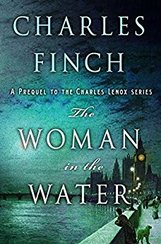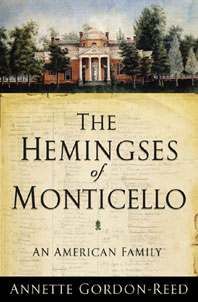|
A couple of years ago, I decided that I’m basically pretty stupid. (For many of you, the only surprise here will be that it took me so long to come to this realization.) I’m a great lover of history, for example, but there are some serious gaps in my knowledge, and I seem to be reaching the age where a lot of the things I learned a long time ago have been… well, forgotten. Am I smarter than a fifth grader? I hope so, but fifth graders have been exposed to certain facts more recently than I have. So, this fiction lover set a goal: Half of what I read in 2018 will be non-fiction. (GULP. This has already been a challenge!) Enter The Hemingses of Monticello: An American Family by Annette Gordon-Reed. This book has been on by TBR list for ages (National Book Award winner, Pulitzer Prize winner…), and thanks to my SIL Heather, it was part of my Christmas haul. I’ve always been interested in the other side of history, the one that doesn’t make our textbooks. Winston Churchill: “History is always told by the victors.” (Also… by the important people. Who coincidentally were male.) This is the meticulously researched story of the Hemingses, a slave family intimately connected with the Jeffersons—and by intimately, yes, I do mean that Sally Hemings, Jefferson’s wife’s African American slave half-sister was in fact the mother of a number of his children. What strikes me here, at about 60% through this 800-pager, is how much Annette Gordon-Reed has pieced together about the Hemingses, and yet ultimately how little we know about them. Sally Hemings is the shadow behind each of these passages, unseen and unheard in the larger narrative of Jefferson the statesman, the president, the national hero. I started this book with gusto in January, then had to back off for a few weeks, because—is this strange? I may have lost perspective—I found myself so emotionally attached and invested in Sally, in this girl (seventeen to Jefferson’s forty-seven, at this point in the story) who doesn’t even appear for entire chapters, that I had to step away. I’ve read quite a lot of fiction on the topic of slavery, sure, and seen some movies, but Gordon-Reed’s research has brought it to life for me in way that feels uncomfortable and therefore very necessary.  Thanks, Louise Penny—now I have another author’s name to recommend to my mom. And ten more books to buy. And also, I’m reading: The Woman in the Water by Charles Finch (February 2018), which is .5 in the Charles Lennox series. I always feel like the cool kid when I’m reading a book that is just out, but the truth is that I have Louise Penny’s recommendation to thank—I follow her FB page—and in a happy coincidence, the book was available in my library’s audio selection. Also, it turns out there are already ten books in the series, and I’m obviously not as sharp as I thought I was. It’s a good, old-fashioned whodoneit detective story, with our hero Charles Lennox (an unlikely detective, since his background makes him a shoo-in for a seat in parliament), his valet Graham who has quite a knack for crime-solving himself, and an endearing cast of secondary characters. If you’re new to this series, like me (… and let’s pause for a moment, to say that I’m really not good at reading a series, because THE COMMITMENT. There are ten other books in this series, and at this rate it will take me a few years to read them all IN ORDER, because I simply must read things in order…), it evokes everything I love about detective stories and true sleuthing, especially at a time period when the profession was new and forensic science was a long way in the future. Thanks, Louise Penny—now I have another author’s name to recommend to my mom. And ten more books to buy.
1 Comment
|
Paula Treick DeBoardJust me. Archives
December 2023
Categories |

 RSS Feed
RSS Feed